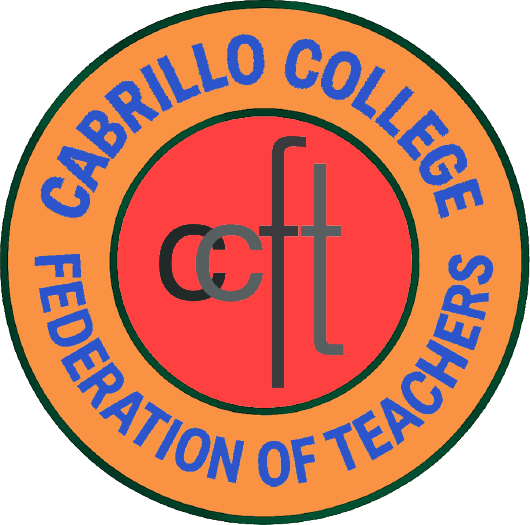This page is just the summary. See the full study that compares Cabrillo’s salaries to other local districts (25-page PDF).
Over the past few months CCFT has compiled data comparing Cabrillo’s faculty salaries to other districts around the state. The results show an alarming decline in Cabrillo’s relative standing compared to other districts.
CCFT continues to work with the district to understand the internal budgeting process and to represent faculty interests at the College Planning Council and other shared governance venues. However, using comparative data gives us a chance to use objectively look at Cabrillo’s spending patterns. This is why we are publicizing these findings now, and why we feel that these patterns are so disturbing.
The data demonstrate that the decline began around 2003 when the actual average salary paid to Cabrillo’s full-time faculty was the fourth highest in the state. By 2007 Cabrillo had slipped to #48 (out of 72 districts; 2 districts did not report) in the state in average for full-time faculty employee salaries.
Major findings of the CCFT 2008 Salary Study:
- Compared to other California community colleges, Cabrillo’s salaries for full-time faculty have fallen dramatically over the last five years.
- Spending on benefits remains below the state average.
- The relative decline of Cabrillo’s full-time faculty in statewide comparisons cannot be attributed to adjunct pay.
- There is no significant correlation between a community college’s size and its spending on instructors, salaries, benefits (with the exception of the smallest colleges)
- In the last five years Cabrillo has created a reasonable “reserve fund” as well as a separate fund for retiree health benefits.
- The “ending balance” for the college last year (2007-08) was at an all-time peak of 12.7 million dollars.
- Cabrillo instructors achieve above average efficiency (students per instructor).
- Cabrillo faculty is compensated below the state average in all measures of salary and benefits.
The full report will be posted in the P drive in the labor/CCFT folder and the full report is also online here.
How did this happen? What steps should be taken now? How can the college balance the needs of the various interests and programs at the College, especially in this crisis atmosphere of insecure state funding and a national recession? How aggressive should CCFT be in negotiations to demand that the district address these frightening trends? How can we motivate the membership, the Cabrillo faculty as a whole, to work with CCFT to impress upon the district the imperative need to address issues of faculty compensation?
These are daunting questions. No one at CCFT means to diminish the challenge facing the college in the wake on the ongoing state fiscal and economic crisis. And CCFT is convinced that the district remains committed to a fair and healthy compensation package for its instructors. There are many competing interests at the college, and over the last five years the college has made many improvements that have benefited the students of our community.
As we move forward into budgetary cutbacks, CCFT strongly encourages all faculty members to participate in discussions and to serve on the CCFT Council and/or share your perspectives and priorities about this and other budget-related issues with your CCFT Division Representatives. The CCFT Council will guide all CCFT decisions about budget-related matters pertaining to our bargaining unit.







